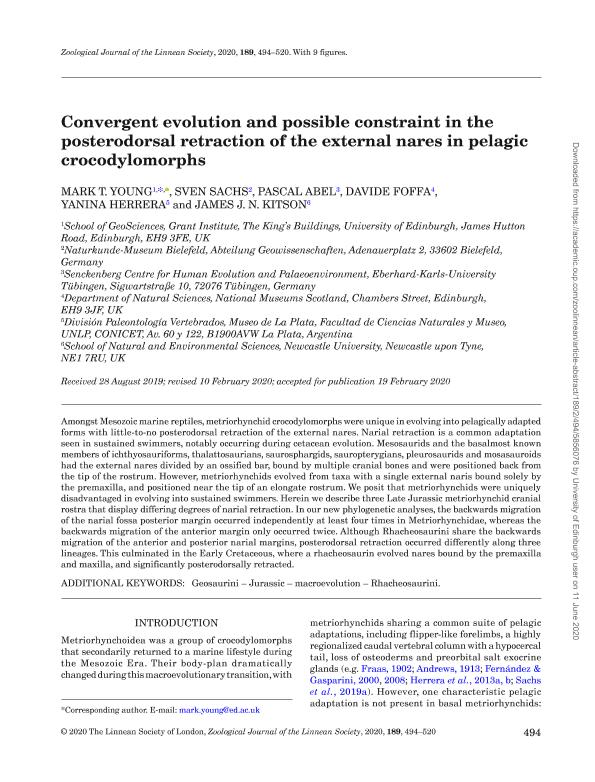Mostrar el registro sencillo del ítem
dc.contributor.author
Young, Mark
dc.contributor.author
Sachs, Sven
dc.contributor.author
Abel, Pascal
dc.contributor.author
Foffa, Davide
dc.contributor.author
Herrera, Laura Yanina

dc.contributor.author
Kitson, James J. N.
dc.date.available
2021-07-28T13:23:40Z
dc.date.issued
2020-06
dc.identifier.citation
Young, Mark; Sachs, Sven; Abel, Pascal; Foffa, Davide; Herrera, Laura Yanina; et al.; Convergent evolution and possible constraint in the posterodorsal retraction of the external nares in pelagic crocodylomorphs; Wiley Blackwell Publishing, Inc; Zoological Journal of the Linnean Society; 189; 2; 6-2020; 494-520
dc.identifier.issn
0024-4082
dc.identifier.uri
http://hdl.handle.net/11336/137182
dc.description.abstract
Amongst Mesozoic marine reptiles, metriorhynchid crocodylomorphs were unique in evolving into pelagically adapted forms with little-to-no posterodorsal retraction of the external nares. Narial retraction is a common adaptation seen in sustained swimmers, notably occurring during cetacean evolution. Mesosaurids and the basalmost known members of ichthyosauriforms, thalattosaurians, saurosphargids, sauropterygians, pleurosaurids and mosasauroids had the external nares divided by an ossified bar, bound by multiple cranial bones and were positioned back from the tip of the rostrum. However, metriorhynchids evolved from taxa with a single external naris bound solely by the premaxilla, and positioned near the tip of an elongate rostrum. We posit that metriorhynchids were uniquely disadvantaged in evolving into sustained swimmers. Herein we describe three Late Jurassic metriorhynchid cranial rostra that display differing degrees of narial retraction. In our new phylogenetic analyses, the backwards migration of the narial fossa posterior margin occurred independently at least four times in Metriorhynchidae, whereas the backwards migration of the anterior margin only occurred twice. Although Rhacheosaurini share the backwards migration of the anterior and posterior narial margins, posterodorsal retraction occurred differently along three lineages. This culminated in the Early Cretaceous, where a rhacheosaurin evolved nares bound by the premaxilla and maxilla, and significantly posterodorsally retracted.
dc.format
application/pdf
dc.language.iso
eng
dc.publisher
Wiley Blackwell Publishing, Inc

dc.rights
info:eu-repo/semantics/openAccess
dc.rights.uri
https://creativecommons.org/licenses/by-nc-sa/2.5/ar/
dc.subject
GEOSAURINI
dc.subject
JURASSIC
dc.subject
MACROEVOLUTION
dc.subject
RHACHEOSAURINI
dc.subject.classification
Paleontología

dc.subject.classification
Ciencias de la Tierra y relacionadas con el Medio Ambiente

dc.subject.classification
CIENCIAS NATURALES Y EXACTAS

dc.title
Convergent evolution and possible constraint in the posterodorsal retraction of the external nares in pelagic crocodylomorphs
dc.type
info:eu-repo/semantics/article
dc.type
info:ar-repo/semantics/artículo
dc.type
info:eu-repo/semantics/publishedVersion
dc.date.updated
2021-07-15T12:25:45Z
dc.journal.volume
189
dc.journal.number
2
dc.journal.pagination
494-520
dc.journal.pais
Reino Unido

dc.journal.ciudad
Londres
dc.description.fil
Fil: Young, Mark. University of Edinburgh; Reino Unido
dc.description.fil
Fil: Sachs, Sven. Museum Bielefeld; Alemania
dc.description.fil
Fil: Abel, Pascal. Eberhard Karls Universität Tübingen. Institute for Archaeological Sciences; Alemania
dc.description.fil
Fil: Foffa, Davide. National Museums Scotland; Reino Unido
dc.description.fil
Fil: Herrera, Laura Yanina. Consejo Nacional de Investigaciones Científicas y Técnicas. Centro Científico Tecnológico Conicet - La Plata; Argentina. Universidad Nacional de La Plata. Facultad de Ciencias Naturales y Museo. División Paleontología Vertebrados; Argentina
dc.description.fil
Fil: Kitson, James J. N.. University of Newcastle; Reino Unido
dc.journal.title
Zoological Journal of the Linnean Society

dc.relation.alternativeid
info:eu-repo/semantics/altIdentifier/url/https://academic.oup.com/zoolinnean/article/189/2/494/5856076
dc.relation.alternativeid
info:eu-repo/semantics/altIdentifier/doi/http://dx.doi.org/10.1093/zoolinnean/zlaa021
Archivos asociados
